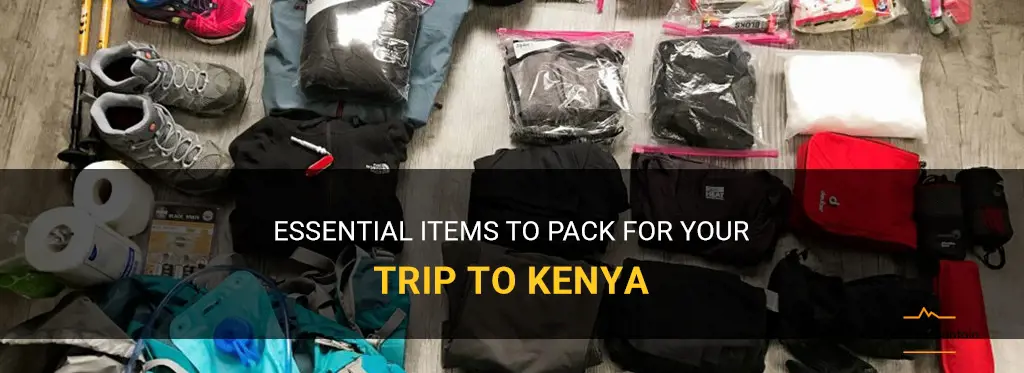
Are you planning a thrilling adventure to the wildlife-rich country of Kenya? Well, before you embark on your journey, it's important to ensure you pack all the essential items to make your trip hassle-free and unforgettable. Whether you're going on a safari in the Maasai Mara, exploring the vibrant city of Nairobi, or relaxing on the stunning beaches of Mombasa, this guide will help you pack smartly and be prepared for whatever Kenya throws your way. From practical necessities like insect repellent and a good pair of walking shoes to cultural items like a Swahili phrasebook and a colorful kikoy, we've got you covered. So grab your suitcase and get ready to discover the wonders of Kenya with confidence and style!
| Characteristics | Values |
|---|---|
| Clothing | Lightweight, breathable, comfortable, modest |
| Footwear | Comfortable walking shoes, sandals, hiking boots |
| Accessories | Hat, sunglasses, sunscreen, insect repellent |
| Medications | Malaria prophylaxis, first aid kit |
| Electronics | Universal adapter, camera, portable charger |
| Toiletries | Toiletries, hand sanitizer, toilet paper |
| Documents | Passport, visa, copy of travel insurance, itinerary |
| Money | Cash, credit/debit cards |
| Miscellaneous | Travel pillow, guidebook, reusable water bottle |
What You'll Learn
- What are the essential clothing items to pack for a trip to Kenya?
- What are the necessary travel documents and identification to bring when traveling to Kenya?
- Are there any specific medication or health items that should be included in a packing list for Kenya?
- What type of footwear is recommended for the various activities in Kenya?
- Are there any specific electronic devices or adapters required for a trip to Kenya?

What are the essential clothing items to pack for a trip to Kenya?
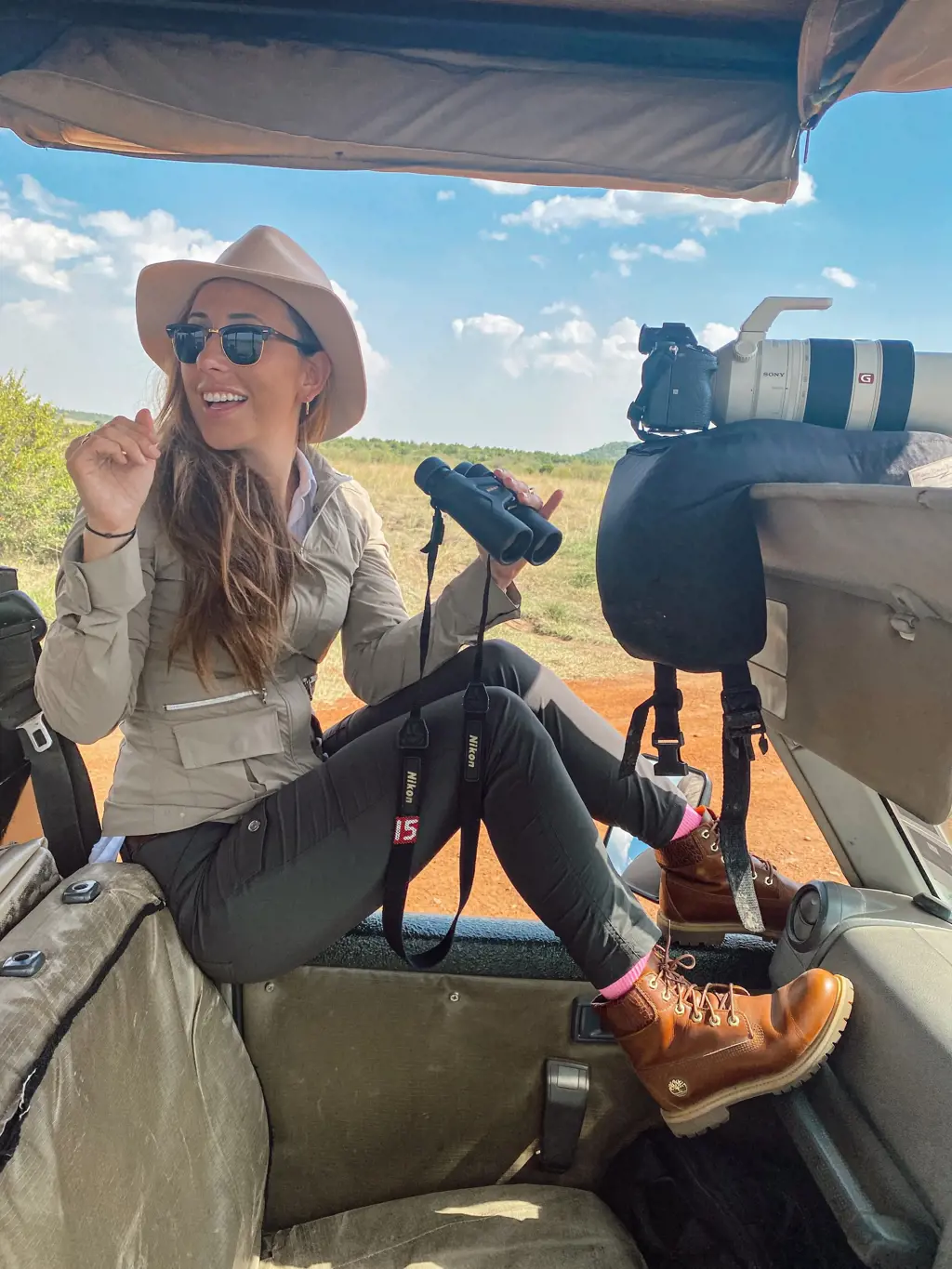
When packing for a trip to Kenya, it is important to consider the climate and cultural norms of the destination. Kenya is located near the Equator, and its climate is generally warm throughout the year. However, temperatures can vary depending on the region and the time of year. Additionally, it is essential to dress modestly and respectfully, especially when visiting religious or rural areas. Here are some essential clothing items to pack for a trip to Kenya:
- Lightweight and breathable clothing: Since Kenya has a warm climate, it is advisable to pack lightweight and breathable clothing made from materials like cotton or linen. These materials allow for better air circulation and help keep you cool in hot weather. Loose-fitting clothes are also recommended to allow for better airflow and comfort.
- Long-sleeved shirts and pants: To protect yourself from the sun, it is crucial to pack long-sleeved shirts and pants. This is especially important if you are planning to go on safaris or spend time outdoors during the day. Long sleeves also provide protection against insects and potential sunburns.
- Scarves or shawls: In Kenya, women often wear scarves or shawls to cover their shoulders or head as a sign of respect. It is a good idea to pack a lightweight scarf or shawl that can be easily carried in your bag and used when needed, especially when visiting religious sites or rural areas.
- Comfortable walking shoes: It is essential to pack comfortable walking shoes, especially if you plan on exploring Kenya's national parks or going on safari. Opt for closed-toe shoes that provide good support and traction. It is also advisable to break in your shoes before your trip to avoid any discomfort or blisters.
- Swimwear: Kenya has stunning coastline and beaches, so packing swimwear is a must if you plan on taking a dip in the ocean or relaxing by the pool. Remember to respect the local culture and dress modestly when swimming in public areas.
- Hat and sunglasses: A wide-brimmed hat and sunglasses are essential items to protect yourself from the sun's harsh rays. They provide shade for your face, neck, and eyes, offering relief from the heat and reducing the risk of sunburn. Additionally, sunglasses help protect your eyes from glare and dust.
- Lightweight rain jacket: Although Kenya is known for its dry and warm climate, it is always a good idea to pack a lightweight rain jacket or a waterproof windbreaker. Weather conditions can change unexpectedly, especially in hilly or mountainous areas. It is better to be prepared for a sudden rain shower.
Remember to pack according to your itinerary and the activities you have planned. If you are planning to visit upscale restaurants or attend formal events, consider packing some dressier attire. Additionally, always check the weather forecast before your trip to ensure you are prepared for any changes in climate. With the right clothing items, you can enjoy your trip to Kenya comfortably and respectfully.
Essential Items to Bring for Your Cape Cod Trip
You may want to see also

What are the necessary travel documents and identification to bring when traveling to Kenya?
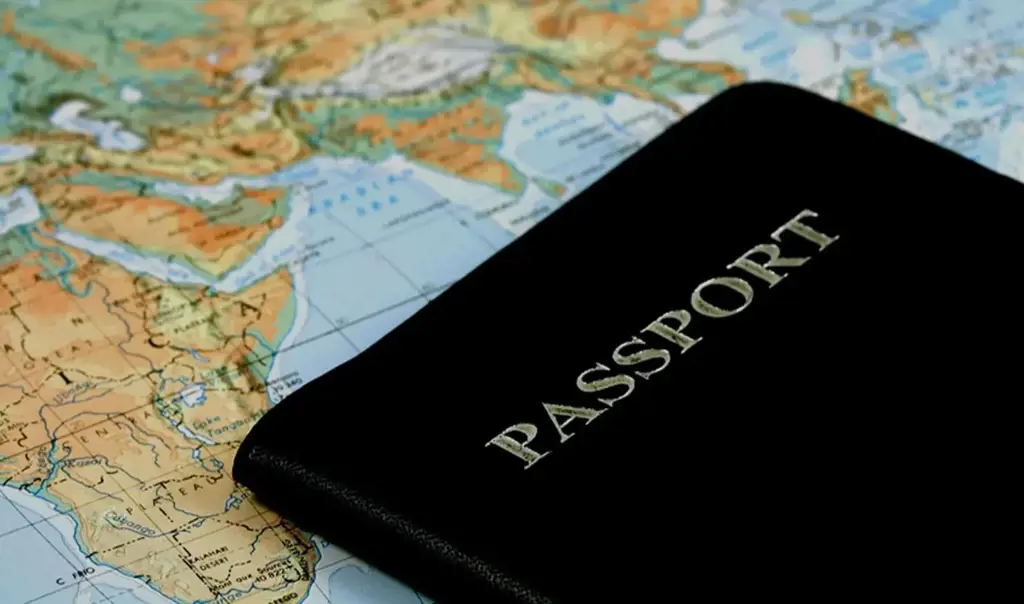
When traveling to Kenya, it is important to have the necessary travel documents and identification in order to enter the country legally and ensure a smooth travel experience. Here is a comprehensive list of the documents you will need:
- Passport: The most important document you need to bring when traveling to Kenya is a valid passport. Your passport should be valid for at least six months beyond your intended departure date from Kenya. Make sure to check the expiration date of your passport beforehand and renew it if necessary.
- Visa: Citizens from most countries require a visa to enter Kenya. There are different types of visas available, including tourist visas, business visas, and transit visas. You can apply for a visa online before your trip or upon arrival at the airport in Kenya. It is recommended to check the visa requirements for your specific nationality well in advance of your trip.
- Yellow Fever Vaccination Certificate: Kenya requires travelers arriving from countries with risk of yellow fever transmission to provide proof of yellow fever vaccination. It is important to check if your country of origin is included in this list and to obtain the necessary vaccination and certificate before traveling.
- Return or onward ticket: In order to enter Kenya, you may be required to provide proof of onward travel. This can be in the form of a return ticket to your country of origin or a ticket to your next destination. Make sure to have these documents readily accessible when going through immigration.
- Accommodation reservation: It is advisable to have a hotel reservation or proof of accommodation in Kenya. Immigration officials may ask for this information as part of the entry requirements. Having a printed copy of your hotel reservation or a confirmation email on your mobile device is recommended.
- Travel itinerary: While not mandatory, having a detailed travel itinerary can be helpful in case you are asked about your plans in Kenya by immigration officials. This can include information on the places you intend to visit, the duration of your stay, and any activities or tours you have planned.
- Travel insurance: Although not strictly required, it is highly recommended to have travel insurance when traveling to Kenya. This will protect you in case of unforeseen circumstances such as medical emergencies, cancellations, or lost luggage. Make sure to have a copy of your insurance policy readily accessible during your trip.
In addition to the above documents, it is always advisable to carry a copy of your passport and other important documents, like travel insurance, in case the originals are lost or stolen. It is also wise to inform a trusted friend or family member about your travel plans and provide them with copies of your important documents.
Remember to check the specific travel requirements and recommendations from your government's travel advisory for Kenya, as these may change from time to time. It is always better to be well-prepared and have all the necessary documents in order to have a hassle-free and enjoyable trip to Kenya.
Essential Packing List for Visiting New Orleans in October
You may want to see also

Are there any specific medication or health items that should be included in a packing list for Kenya?
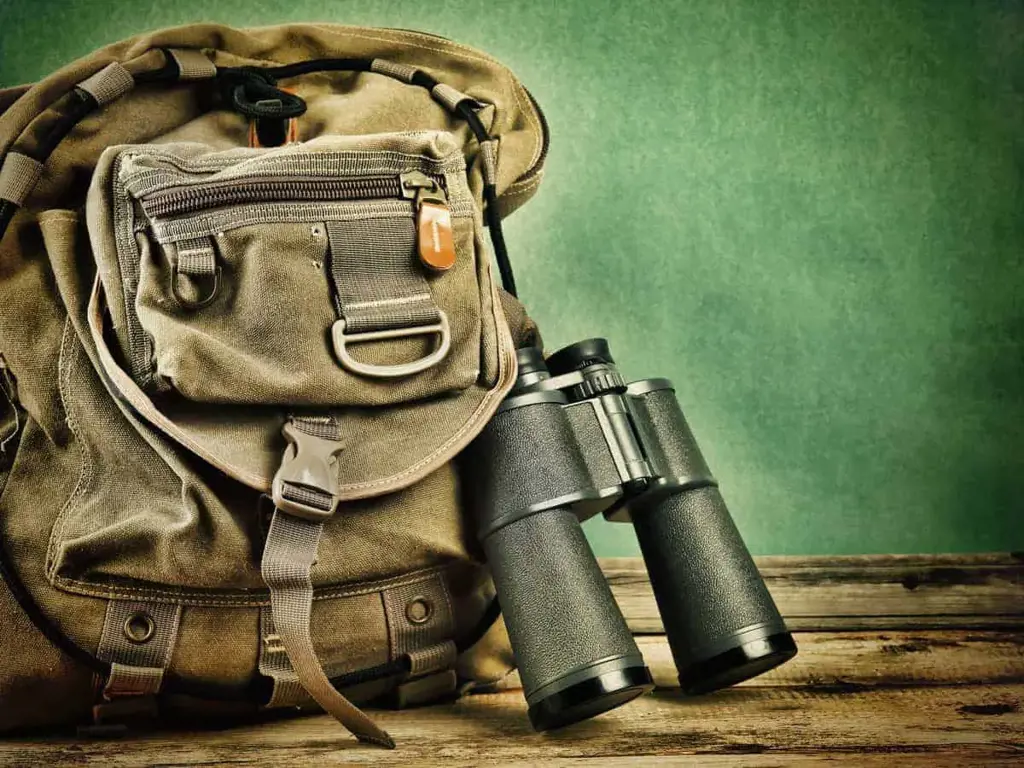
When traveling to Kenya, it is important to be prepared and think ahead about the necessary health items and medications to include in your packing list. While Kenya is a beautiful country to explore, it is also important to be mindful of potential health risks and take preventative measures.
Here are a few specific medication and health items that you should consider including in your packing list when visiting Kenya:
- Malaria Medication: Malaria is a prevalent disease in Kenya, so it is crucial to take the necessary precautions. Consult with your healthcare provider before your trip to determine the most suitable malaria medication for you. Common options include Malarone, Doxycycline, and Lariam. It is essential to start taking the medication before your trip and continue it for a specified period after you return home.
- Insect Repellent: Protecting yourself from mosquito bites is another critical aspect of preventing malaria. Pack a high-quality insect repellent containing DEET and apply it generously to your exposed skin. Additionally, consider bringing mosquito nets or clothing treated with insect repellent for added protection, particularly if you plan on staying in more rural or mosquito-prone areas.
- Sunscreen and Sun Protection: Kenya is located close to the equator, which means the sun can be intense. Pack a broad-spectrum sunscreen with a high SPF to shield your skin from harmful UV rays. Wearing a wide-brimmed hat, sunglasses, and lightweight, long-sleeved clothing can also help protect you from the sun.
- First Aid Kit: Having a basic first aid kit can be incredibly useful, particularly when traveling to remote areas where medical facilities may be limited. Include items such as adhesive bandages, antiseptic ointment, pain relievers, diarrhea medication, and any prescription medications you require.
- Oral Rehydration Salts: In case of dehydration due to diarrhea or other illnesses, it is advisable to carry oral rehydration salts. These mixtures contain necessary electrolytes and can help restore hydration levels quickly.
- Prescription Medications: If you take any prescription medications, ensure you have an adequate supply for your entire trip. It is also wise to carry a copy of your prescription or a letter from your healthcare provider stating the medical necessity for the medications.
- Water Purification Tablets or Filter: To avoid drinking contaminated water, carry water purification tablets or a portable water filter. This will enable you to safely consume water from various sources, ensuring you stay hydrated without the risk of waterborne illnesses.
Remember to consult with a healthcare professional or travel medicine specialist before your trip to discuss any specific health concerns or additional vaccinations that may be necessary for your specific itinerary.
It is also advisable to check the latest travel advisories from your country's travel department or the Centers for Disease Control and Prevention (CDC) for any updates on health-related issues or precautions for traveling to Kenya.
By proactively packing these essential health items and medications, you can better safeguard your well-being and make the most of your time in Kenya.
Essential Items to Pack for an Unforgettable Grand Canyon Adventure
You may want to see also

What type of footwear is recommended for the various activities in Kenya?

When visiting Kenya, it is important to choose the right footwear to ensure both comfort and safety. Kenya offers a variety of activities, such as safaris, hiking, and beach excursions, each requiring different types of footwear. Here, we will explore the recommended footwear for each activity.
- Safaris: Kenya is famous for its wildlife safaris, where tourists can observe lions, elephants, zebras, and other exotic animals up close. When going on a safari, it is crucial to wear comfortable and sturdy footwear. Closed-toe shoes or hiking boots are ideal for protecting your feet from potential injuries caused by rough terrain or encounters with insects. Additionally, opt for shoes with good traction to prevent slipping in muddy areas or on uneven surfaces. Kenya's climate is predominantly hot, so choose breathable footwear to keep your feet cool and comfortable throughout the day.
- Hiking: Kenya boasts breathtaking landscapes, including Mount Kenya and the Great Rift Valley, making it a popular destination for hiking enthusiasts. For hiking trails, it is essential to wear proper hiking boots or trail shoes. These shoes provide ankle support, preventing strains or sprains during challenging terrains. Look for shoes with a good grip and durable outsoles to handle steep slopes and rocky surfaces. Don't forget to wear moisture-wicking socks and carry blister pads for added comfort.
- Beach Excursions: Kenya is also known for its stunning coastline, with beautiful sandy beaches and turquoise waters. When enjoying beach activities, it is best to opt for sandals or flip-flops. Choose waterproof, quick-drying footwear that provides maximum grip to avoid slipping on wet surfaces. Additionally, consider sandals with adjustable straps for a secure fit during water activities or walks along the beach. Remember to bring along a pair of lightweight water shoes if you plan to engage in snorkeling or reef exploration.
- Urban Explorations: Nairobi, the capital city of Kenya, offers a vibrant urban experience with numerous attractions and markets. Comfortable walking shoes or sneakers are ideal for exploring the city streets. Choose shoes with cushioning and arch support to protect your feet during long walks. Avoid wearing high heels or uncomfortable shoes as Nairobi's public transportation and uneven pavement can be challenging to navigate in improper footwear.
- Cultural Visits: Kenya's rich cultural heritage is showcased through various festivals and ceremonies. When visiting local communities or cultural attractions, it is respectful to wear modest and comfortable footwear. Closed-toe shoes or sandals that cover the feet are recommended, especially when entering religious sites or participating in traditional dances. Reflecting the local culture through your choice of footwear shows cultural sensitivity and respect.
In conclusion, selecting the appropriate footwear for your activities in Kenya is crucial for comfort, safety, and cultural sensitivity. Whether you're embarking on a safari, hiking, exploring urban areas, or visiting cultural sites, consider the specific requirements of each activity. By carefully choosing the right footwear, you can maximize your enjoyment and ensure a memorable experience in Kenya.
Essential Items to Bring for Your Niagara Falls Adventure
You may want to see also

Are there any specific electronic devices or adapters required for a trip to Kenya?
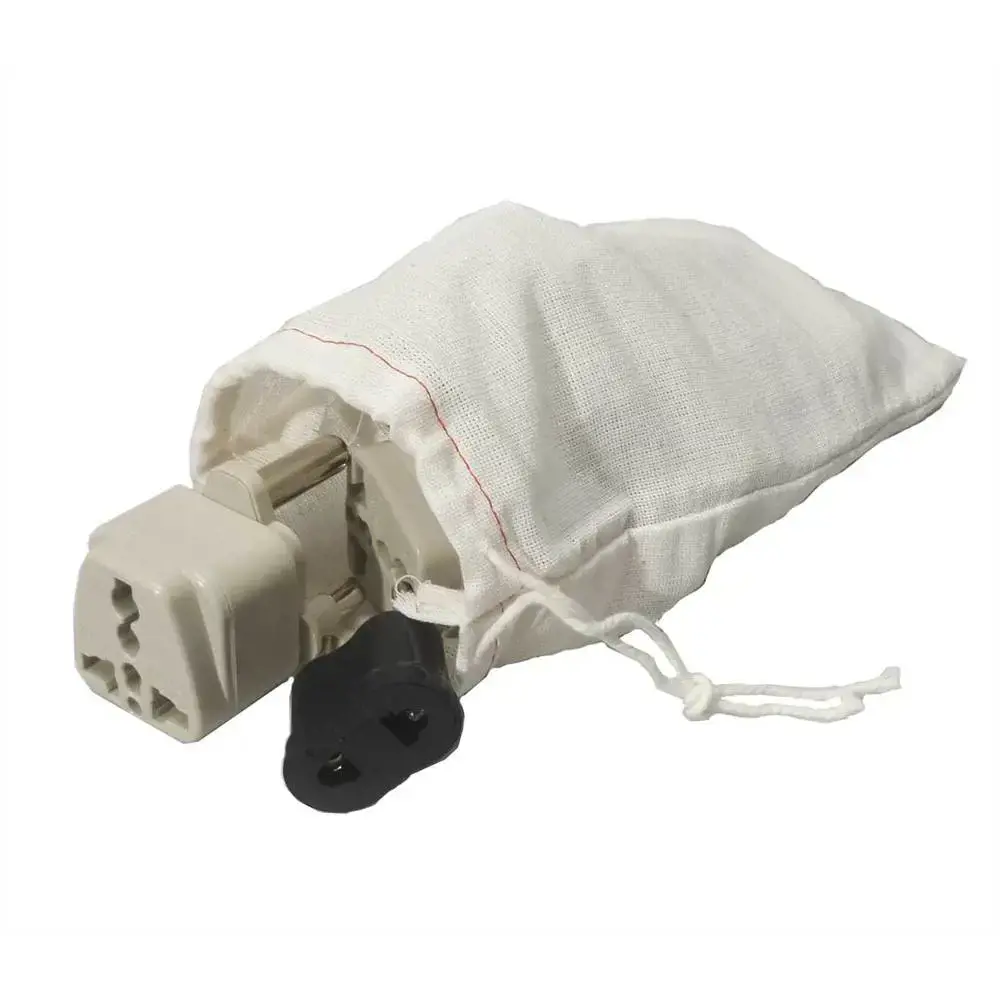
When planning a trip to Kenya, it is essential to consider the electronic devices and adapters required to ensure a smooth and enjoyable journey. Kenya uses 240 volts AC at 50Hz, and the power plugs and sockets used are of type G. Therefore, it is crucial to have the appropriate devices and adapters to be able to charge your electronic devices and keep them powered throughout your trip.
One of the main electronic devices you should have is a universal travel adapter. This adapter will allow you to plug in your devices and use them with the Kenyan power outlets. Make sure to choose an adapter that is compatible with type G sockets, as this is the standard plug used in Kenya. Universal travel adapters are readily available online and in most travel or electronics stores.
In addition to a travel adapter, it is also advisable to bring a power strip or multi-plug extension cord. This will allow you to charge multiple devices at once, as well as provide additional outlets if needed. Power strips with surge protection are highly recommended to protect your devices from power surges that can occur in some areas.
When it comes to specific electronic devices, a portable charger or power bank can be a lifesaver, especially if you plan on spending time in remote areas or on extended trips. These devices will allow you to charge your devices on the go, without needing access to a power outlet. Choose a power bank with high capacity so that it can fully charge your devices multiple times before needing to be recharged itself.
If you are planning on using a laptop or other electronic devices that require a three-pronged power cord, it may be necessary to bring a grounded adapter or converter. This will allow you to safely plug in and use your device without any electrical issues. It is essential to check the voltage requirements of your electronic devices before plugging them into Kenyan power outlets. Most modern electronic devices are designed to handle a range of voltages, but if you are unsure, consult the manufacturer's instructions or contact customer support.
Lastly, if you plan on using any high-powered devices, such as hair dryers or curling irons, it is crucial to check if they are compatible with the voltage in Kenya. These types of devices often have specific voltage requirements, and using them with the wrong voltage can result in damage or even a safety hazard. In such cases, it may be necessary to bring a voltage converter or transformer to ensure the proper functioning of your devices.
In conclusion, when traveling to Kenya, it is important to bring the necessary electronic devices and adapters to ensure compatibility with the local power outlets. A universal travel adapter, power strip, portable charger, grounded adapter, and voltage converter may be essential depending on your specific needs. By being prepared and having the right equipment, you can avoid any inconveniences and enjoy your trip to Kenya without any worries about powering your electronic devices.
Essential Items to Pack for an Unforgettable Spring Break Experience
You may want to see also
Frequently asked questions
When packing for a trip to Kenya, it is important to bring lightweight and breathable clothing, as the country has a warm climate. It is also recommended to pack a hat or a cap, sunglasses, and sunscreen to protect yourself from the strong African sun. Additionally, it is advisable to bring insect repellent, as mosquitoes can be a nuisance in certain parts of the country.
While some accommodations in Kenya provide mosquito nets, it is still advisable to bring your own if you have the space. Mosquito nets can offer an extra layer of protection against mosquitoes and other insects, especially if you are camping or staying in more rustic accommodations.
When packing for a trip to Kenya, it is important to have comfortable and sturdy footwear. Sneakers or hiking boots are recommended, especially if you plan on doing any outdoor activities or going on safaris. It is also a good idea to bring a pair of lightweight sandals or flip-flops for walking around the hotel or beach.
It is always a good idea to pack a small first aid kit when traveling, especially to remote areas. This should include basic medical supplies such as band-aids, antiseptic cream, painkillers, and any necessary prescription medications. It is also recommended to bring rehydration salts in case of dehydration.
When going on a safari in Kenya, it is important to pack items such as binoculars, a camera with extra batteries and memory cards, a wide-brimmed hat, and a lightweight, long-sleeved shirt and trousers to protect against the sun and insects. It is also advisable to bring a small backpack to carry water, snacks, and other essentials while on the safari.







